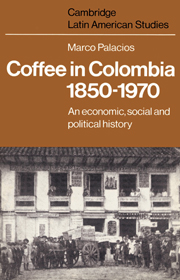Book contents
- Frontmatter
- Contents
- List of tables
- List of figures
- List of maps
- Preface
- Acknowledgements
- 1 The Colombian export economy in the second half of the nineteenth century
- 2 The making of an oligarchy
- 3 Land and society in central Colombia in the second half of the nineteenth century
- 4 The internal structure of the coffee haciendas, 1870–1930
- 5 Living conditions and internal contradictions in the hacienda structure
- 6 Inflation, devaluation, and export taxes, 1870–1904
- 7 Crisis and transition towards the second cycle of expansion, 1903–10
- 8 Private appropriation of public lands in the west
- 9 Sociopolitical elements in antioquen̄o colonization
- 10 Coffee expansion and the strengthening of the Liberal model of development, 1910–50
- 11 The international cycle and coffee policies confronting the peasant, 1930–70
- Appendix 1 Sample of coffee estates in Cundinamarca and Antioquia, 1870–98
- Appendix 2 Piece-rate wages on two coffee haciendas, 1879–1933
- Appendix 3 Concentration of the coffee export trade (percentage controlled by 20 leading companies), 1933–70
- Appendix 4 Foreign exchange rates in Colombia, 1870–1970
- Weights and measures
- Glossary
- Notes
- Biblography
- Index
- CAMBRIDGE LATIN AMERICAN STUDIES
4 - The internal structure of the coffee haciendas, 1870–1930
Published online by Cambridge University Press: 06 October 2009
- Frontmatter
- Contents
- List of tables
- List of figures
- List of maps
- Preface
- Acknowledgements
- 1 The Colombian export economy in the second half of the nineteenth century
- 2 The making of an oligarchy
- 3 Land and society in central Colombia in the second half of the nineteenth century
- 4 The internal structure of the coffee haciendas, 1870–1930
- 5 Living conditions and internal contradictions in the hacienda structure
- 6 Inflation, devaluation, and export taxes, 1870–1904
- 7 Crisis and transition towards the second cycle of expansion, 1903–10
- 8 Private appropriation of public lands in the west
- 9 Sociopolitical elements in antioquen̄o colonization
- 10 Coffee expansion and the strengthening of the Liberal model of development, 1910–50
- 11 The international cycle and coffee policies confronting the peasant, 1930–70
- Appendix 1 Sample of coffee estates in Cundinamarca and Antioquia, 1870–98
- Appendix 2 Piece-rate wages on two coffee haciendas, 1879–1933
- Appendix 3 Concentration of the coffee export trade (percentage controlled by 20 leading companies), 1933–70
- Appendix 4 Foreign exchange rates in Colombia, 1870–1970
- Weights and measures
- Glossary
- Notes
- Biblography
- Index
- CAMBRIDGE LATIN AMERICAN STUDIES
Summary
The hacendado is a man of progress, which for him is synonymous with unrestricted access to a ‘free’ labour supply, better roads, cheap railways, and free exports. He is Europe-centric. His desire is to impose civilization in the hollows of the Andes, through growing coffee. He was once a capitalist entrepreneur, but he became an ‘oligarch’ – in the Colombian social meaning, not the wider political meaning of the term. He got land and credit, and did business on the bases of trust and honour, business in which family and social relationships and political contacts were often all-important. The family, the politico-social connection, sends out its pioneers. Once the haciendas are founded, the commission agents of foreign houses appear and offer funds at low interest and secure market for the product. If he is a Liberal, he emphasizes his faith in the common cause of international capitalism, rebaptizing his properties with names like Java, Ceilán, Costa Rica, Brasil, Liberia, Arabia, remote countries which had also ascended, or were ascending, through coffee in the scale of a universal civilization.
But the internal structure of the hacienda was far from capitalist. It rested on colonial origins. The coffee hacienda as an economic and social construct, as the concrete expression of relations between the hacendado – urban in his origins and vocation – and the peasant, is the subject of this chapter. The background is a country which at the same time is developing two defining characteristics: it is gradually becoming a monoexporting economy, and outside the coffee sector the latifundio – in cattle, sugar, and bananas – is expanding and consolidating.
- Type
- Chapter
- Information
- Coffee in Colombia, 1850–1970An Economic, Social and Political History, pp. 77 - 99Publisher: Cambridge University PressPrint publication year: 1980



